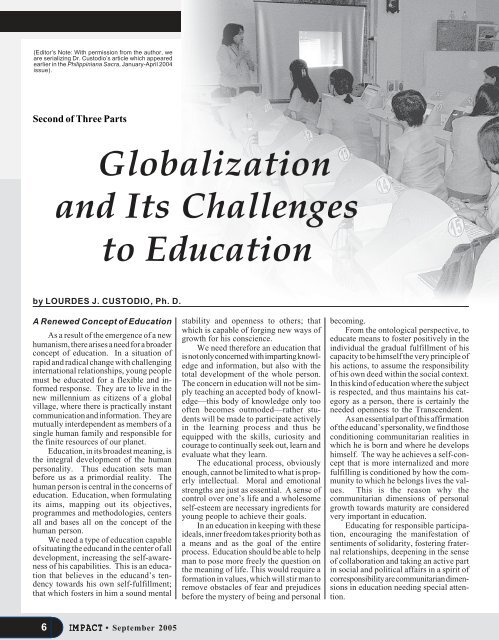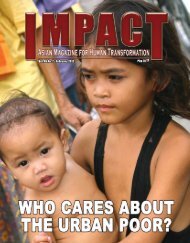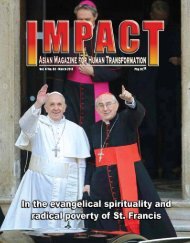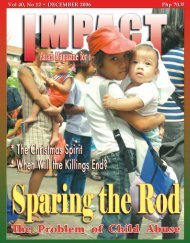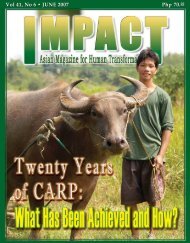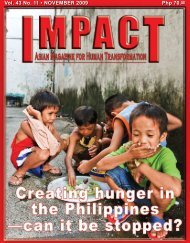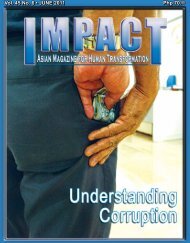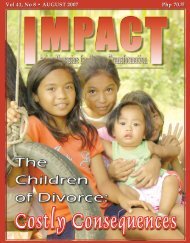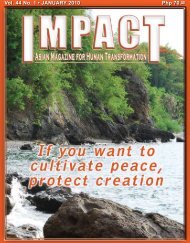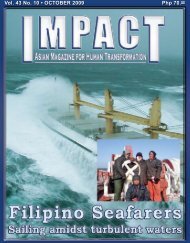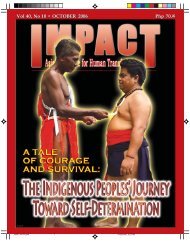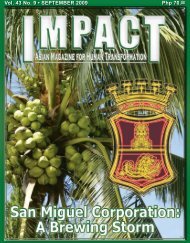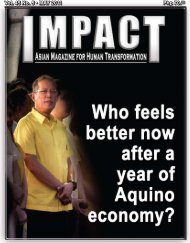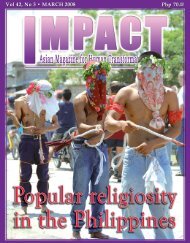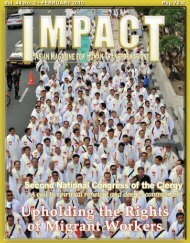SEPTEMBER 2005 Vol 39, No 6 • Php 70.00 Php 70.00 - IMPACT ...
SEPTEMBER 2005 Vol 39, No 6 • Php 70.00 Php 70.00 - IMPACT ...
SEPTEMBER 2005 Vol 39, No 6 • Php 70.00 Php 70.00 - IMPACT ...
- No tags were found...
You also want an ePaper? Increase the reach of your titles
YUMPU automatically turns print PDFs into web optimized ePapers that Google loves.
(Editor’s <strong>No</strong>te: With permission from the author, we<br />
are serializing Dr. Custodio’s article which appeared<br />
earlier in the Philippiniana Sacra, January-April 2004<br />
issue).<br />
Second of Three Parts<br />
Globalization<br />
and Its Challenges<br />
to Education<br />
by LOURDES J. CUSTODIO, Ph. D.<br />
A Renewed Concept of Education<br />
As a result of the emergence of a new<br />
humanism, there arises a need for a broader<br />
concept of education. In a situation of<br />
rapid and radical change with challenging<br />
international relationships, young people<br />
must be educated for a flexible and informed<br />
response. They are to live in the<br />
new millennium as citizens of a global<br />
village, where there is practically instant<br />
communication and information. They are<br />
mutually interdependent as members of a<br />
single human family and responsible for<br />
the finite resources of our planet.<br />
Education, in its broadest meaning, is<br />
the integral development of the human<br />
personality. Thus education sets man<br />
before us as a primordial reality. The<br />
human person is central in the concerns of<br />
education. Education, when formulating<br />
its aims, mapping out its objectives,<br />
programmes and methodologies, centers<br />
all and bases all on the concept of the<br />
human person.<br />
We need a type of education capable<br />
of situating the educand in the center of all<br />
development, increasing the self-awareness<br />
of his capabilities. This is an education<br />
that believes in the educand’s tendency<br />
towards his own self-fulfillment;<br />
that which fosters in him a sound mental<br />
stability and openness to others; that<br />
which is capable of forging new ways of<br />
growth for his conscience.<br />
We need therefore an education that<br />
is not only concerned with imparting knowledge<br />
and information, but also with the<br />
total development of the whole person.<br />
The concern in education will not be simply<br />
teaching an accepted body of knowledge—this<br />
body of knowledge only too<br />
often becomes outmoded—rather students<br />
will be made to participate actively<br />
in the learning process and thus be<br />
equipped with the skills, curiosity and<br />
courage to continually seek out, learn and<br />
evaluate what they learn.<br />
The educational process, obviously<br />
enough, cannot be limited to what is properly<br />
intellectual. Moral and emotional<br />
strengths are just as essential. A sense of<br />
control over one’s life and a wholesome<br />
self-esteem are necessary ingredients for<br />
young people to achieve their goals.<br />
In an education in keeping with these<br />
ideals, inner freedom takes priority both as<br />
a means and as the goal of the entire<br />
process. Education should be able to help<br />
man to pose more freely the question on<br />
the meaning of life. This would require a<br />
formation in values, which will stir man to<br />
remove obstacles of fear and prejudices<br />
before the mystery of being and personal<br />
becoming.<br />
From the ontological perspective, to<br />
educate means to foster positively in the<br />
individual the gradual fulfillment of his<br />
capacity to be himself the very principle of<br />
his actions, to assume the responsibility<br />
of his own deed within the social context.<br />
In this kind of education where the subject<br />
is respected, and thus maintains his category<br />
as a person, there is certainly the<br />
needed openness to the Transcendent.<br />
As an essential part of this affirmation<br />
of the educand’s personality, we find those<br />
conditioning communitarian realities in<br />
which he is born and where he develops<br />
himself. The way he achieves a self-concept<br />
that is more internalized and more<br />
fulfilling is conditioned by how the community<br />
to which he belongs lives the values.<br />
This is the reason why the<br />
communitarian dimensions of personal<br />
growth towards maturity are considered<br />
very important in education.<br />
Educating for responsible participation,<br />
encouraging the manifestation of<br />
sentiments of solidarity, fostering fraternal<br />
relationships, deepening in the sense<br />
of collaboration and taking an active part<br />
in social and political affairs in a spirit of<br />
corresponsibility are communitarian dimensions<br />
in education needing special attention.<br />
6<br />
<strong>IMPACT</strong> <strong>•</strong> September <strong>2005</strong>


